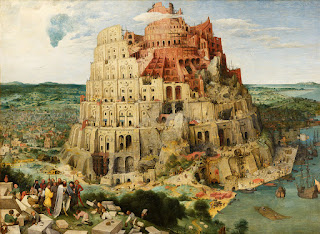ENGLISH has evolved from a language spoken by a few people into the most widely spoken language in the world.
This video will definitely help you understand some of the issues we have been discussing so far in class. You will see it is divided into different chapters which show different stages in the historical development of the language.
After watching (perhaps twice or three times), complete the activities which follow. The answers will be socialized in class...
Make sure you include these activities in your PORTFOLIO.
Don´t worry that much if you do not understand every sigle word! Pay attention to pictures and images.... they will help you understand.
ACTIVITY 1:
Answer these questions
- Who led the Norman invasion into England? At that time, who spoke French? Who spoke Latin? Who spoke English?
- How many words did the English absorb from the Normans?
- How many words and phrases are said to have been incorporated or "invented" by Shakespeare?
- When was The Authorized or King James´ translation of the Bible printed? Why was this translation so important?
- Why did so many words had to be invented during the 17th century?
- Where does the word BARBICUE come from? How about BOOMERANG and YOGA?
- How many entries did the First Dictionary of the English Language contain?
- When did the first Oxford English Dictionary appear?
- Which aspects of the American culture have contributed largely to the spread of English throughout the wrorld?
- When was the first e-mail sent? Where from?
- When did the Internet start?
- What do the abbreviations IMHO, BTW, LOL and FAQ mean?
- Can native speakers claim the ownership of Global English?
- Approximately, what percentage of the world population is able to (at least) ask for directions in English?
ACTIVITY 2:
The video is divided into 10 chapters. IN YOUR PORTFOLIO, write down the title given to each of those chapters and include some key information related to it. You may also want to stick/add related pictures/images to liven up your portfolio entrance.
ACTIVITY 3:
The video is divided into 10 chapters. IN YOUR PORTFOLIO, write down the title given to each of those chapters and include some key information related to it. You may also want to stick/add related pictures/images to liven up your portfolio entrance.
ACTIVITY 3:
LANGUAGE IN USE:
A_ The following are some of the idiomatic expressions which were used in King James´s translation of the Bible. Look up their meanings.
- "A bird in the hand is worth (than) two in the bush".
- " A wolf in sheep´s clothing".
- "A leopard can´t change its spots".
B_ Follow-up activity
As you may imagine, English is full of popular sayings and idiomatic expressions related to the animal world. You will find some of them below. Look them up in a dictionary and think of the correct Spanish counterpart. Include this activity in your PORTFOLIO as well!
- Let the cat out of the bag.
- To take the bull by the horns.
- "It´s raining cats and dogs".
- "Birds of a feather flock together".
- To Smell rat.
- "Don´t look a gift horse in the mouth".
- "Don´t be a chicken Little".
- "When the cat´s away, the mice will play".
- To work like a dog.
- To bark up the wrong tree.
- "Don´t bite the hand that feeds you".
- "To take someone under your wing".
- To be as happy as a pig in mud.
- "I could eat a horse!".
- "He´s a wolf in sheep´s clothing".
- "There´s a frog in my throat".


